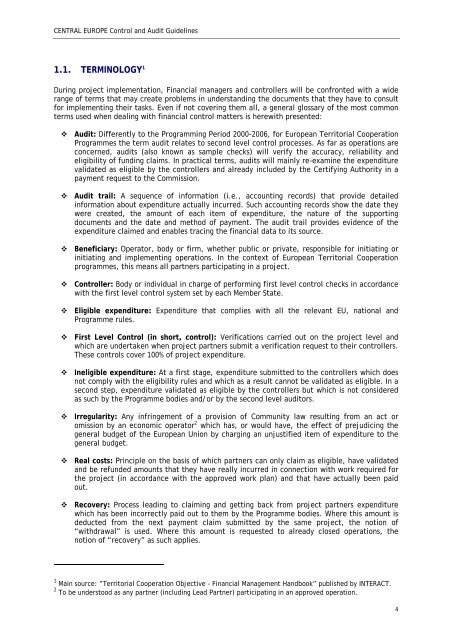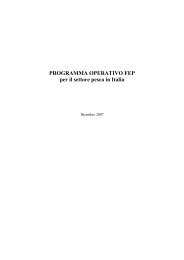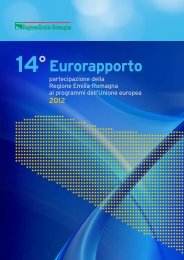Control and Audit Guidelines - Fondi Europei 2007-2013
Control and Audit Guidelines - Fondi Europei 2007-2013
Control and Audit Guidelines - Fondi Europei 2007-2013
You also want an ePaper? Increase the reach of your titles
YUMPU automatically turns print PDFs into web optimized ePapers that Google loves.
CENTRAL EUROPE <strong>Control</strong> <strong>and</strong> <strong>Audit</strong> <strong>Guidelines</strong>1.1. TERMINOLOGY 1During project implementation, Financial managers <strong>and</strong> controllers will be confronted with a widerange of terms that may create problems in underst<strong>and</strong>ing the documents that they have to consultfor implementing their tasks. Even if not covering them all, a general glossary of the most commonterms used when dealing with financial control matters is herewith presented: <strong>Audit</strong>: Differently to the Programming Period 2000-2006, for European Territorial CooperationProgrammes the term audit relates to second level control processes. As far as operations areconcerned, audits (also known as sample checks) will verify the accuracy, reliability <strong>and</strong>eligibility of funding claims. In practical terms, audits will mainly re-examine the expenditurevalidated as eligible by the controllers <strong>and</strong> already included by the Certifying Authority in apayment request to the Commission. <strong>Audit</strong> trail: A sequence of information (i.e., accounting records) that provide detailedinformation about expenditure actually incurred. Such accounting records show the date theywere created, the amount of each item of expenditure, the nature of the supportingdocuments <strong>and</strong> the date <strong>and</strong> method of payment. The audit trail provides evidence of theexpenditure claimed <strong>and</strong> enables tracing the financial data to its source. Beneficiary: Operator, body or firm, whether public or private, responsible for initiating orinitiating <strong>and</strong> implementing operations. In the context of European Territorial Cooperationprogrammes, this means all partners participating in a project. <strong>Control</strong>ler: Body or individual in charge of performing first level control checks in accordancewith the first level control system set by each Member State. Eligible expenditure: Expenditure that complies with all the relevant EU, national <strong>and</strong>Programme rules. First Level <strong>Control</strong> (in short, control): Verifications carried out on the project level <strong>and</strong>which are undertaken when project partners submit a verification request to their controllers.These controls cover 100% of project expenditure. Ineligible expenditure: At a first stage, expenditure submitted to the controllers which doesnot comply with the eligibility rules <strong>and</strong> which as a result cannot be validated as eligible. In asecond step, expenditure validated as eligible by the controllers but which is not consideredas such by the Programme bodies <strong>and</strong>/or by the second level auditors. Irregularity: Any infringement of a provision of Community law resulting from an act oromission by an economic operator 2 which has, or would have, the effect of prejudicing thegeneral budget of the European Union by charging an unjustified item of expenditure to thegeneral budget. Real costs: Principle on the basis of which partners can only claim as eligible, have validated<strong>and</strong> be refunded amounts that they have really incurred in connection with work required forthe project (in accordance with the approved work plan) <strong>and</strong> that have actually been paidout. Recovery: Process leading to claiming <strong>and</strong> getting back from project partners expenditurewhich has been incorrectly paid out to them by the Programme bodies. Where this amount isdeducted from the next payment claim submitted by the same project, the notion of“withdrawal” is used. Where this amount is requested to already closed operations, thenotion of “recovery” as such applies.1 Main source: ”Territorial Cooperation Objective - Financial Management H<strong>and</strong>book” published by INTERACT.2 To be understood as any partner (including Lead Partner) participating in an approved operation.4









